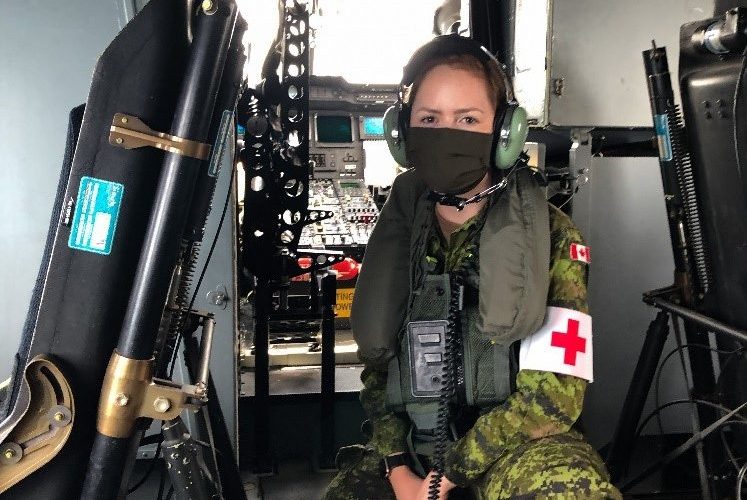A flexible, online schedule let student Stephanie Patz juggle coursework with her duties as an army medic, deployed in the early days of the COVID-19 pandemic.
This meant she could complete the BCIT part-time Introduction to Forensic Health Sciences even under very tough circumstances.
“I was able to use my down time to work ahead on the course which also made it much easier to manage,” reflects Stephanie.
“If I had a free day, I worked ahead in the class as much as I could. It was so great that all weeks of this course were made available from the beginning — some online courses only release their content on a week-by-week basis.”
Why Forensic Health Science?
Stephanie has always been interested in forensics.
“I had always wanted to become a forensic pathologist as a kid, but as life goes, I never ended up going down the path of medical school, and I moved on from that dream,” says Stephanie.
“This past year while I was writing a paper on Medical Assistance in Dying (MAiD) for nursing school, I had stumbled upon guidelines for how to manage a post-mortem patient that had used MAiD — and it stated to ‘contact the coroner.’ A light switched on in my brain and something told me there had to be a way that I could use my nursing degree in this line of work.”
She got in touch with the BC Coroners Service, who confirmed they hire nurses as coroners: “They informed me that BCIT offered a Forensics Health Sciences program, and they suggested I take some courses — if not the whole program — to gain report writing knowledge as well as basic investigative skills required for the job.”
While deployed in May and June to assist with the pandemic-related care home crisis in Quebec and Ontario, she says, she saw practical applications for the things she was learning.
“This course opened my eyes to all the different areas that forensic nursing can be applied,” reflects Stephanie.
“In my line of work with the military, I realized that the principles of forensic nursing can be applied to the military setting, particularly the investigative side which occurred as a result of the COVID-19 pandemic.”
Remote learning offers flexibility
Her forensics instructor was helpful and supportive.
“At the beginning when I learnt that I was being deployed, I contacted my instructor to ask for any possible leniency with assignments as I did not know what my schedule would be like while I was gone — and I did not know how often I would have internet access,” she says.
But it all worked out.
“The way this course was offered, and the fact that no synchronous attendance was required, and that there were no in-person exams, made it incredibly manageable to complete. If it had not been an option, I would have had to take the course now in the fall semester which would have made my school workload much heavier and challenging to balance.”
It’s no surprise that Stephanie plans to continue studying forensics moving forward, and she’s impressed with the BCIT program.
“Because the online platform was so incredibly user-friendly, compared to other schools, I definitely plan to take more forensic courses once I graduate nursing school in order to reach my goals of being a coroner,” says Stephanie, who is currently working on a school placement at St. Paul’s Hospital, part of completing her nursing degree from another school.
What’s next?
In addition to taking courses, Stephanie also works at Richmond Hospital and Lions Gate Hospital as a porter and COVID-19 screener, while employed as an army medic. She adds: “I also intend to complete a nursing specialty, ideally critical care nursing as this will help me progress further with my military career.”
Stephanie has some great advice for anyone curious about forensics at BCIT:
“I would say to go for it if it is an area of interest for you. The Introduction to Forensics course I took was fun and incredibly manageable,” she says.
“It honestly felt like a break from nursing school. There are so many different career paths you can go down with forensics, and this is a great stepping-stone that can open your eyes to all the career options out there.”
BCIT Forensics offers the most comprehensive program of its kind in Canada, with courses and programs that lead to advanced certificates, bachelor degrees, and graduate certificates. Learn more at bcit.ca/forensics
Thanks to C. Eustace for this story

Stephanie was an awesome student. Very dedicated to learning, and serving her country while still helping others. True qualities of a forensic nurse.
Never met Stephanie, but I did know her brother through cadets. Both are focused and hard working, it is cool that you went the forensics path as that is the route I went. I would highly recommend taking Forensic Anthropology as an elective course since it is directly applicable!